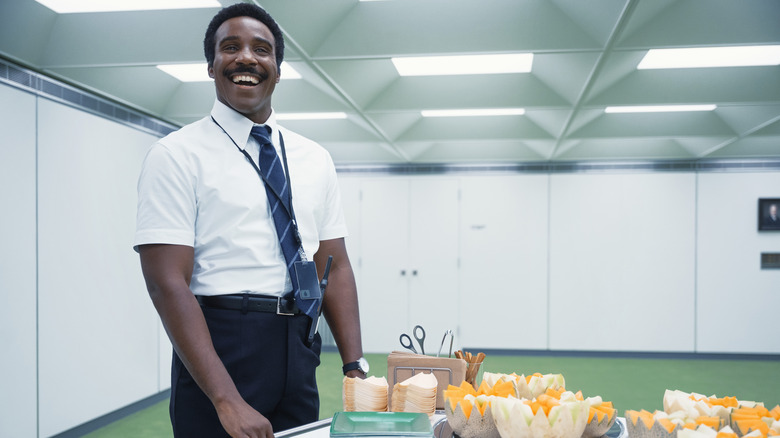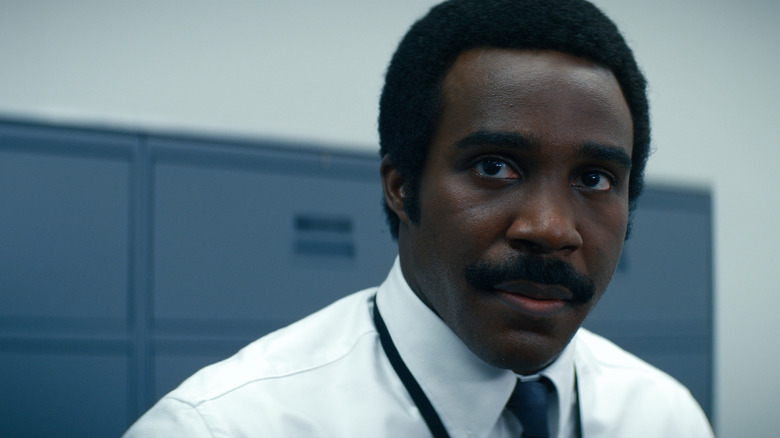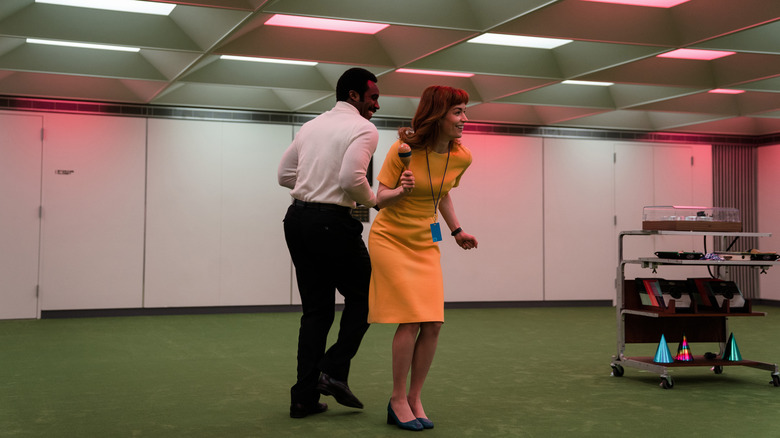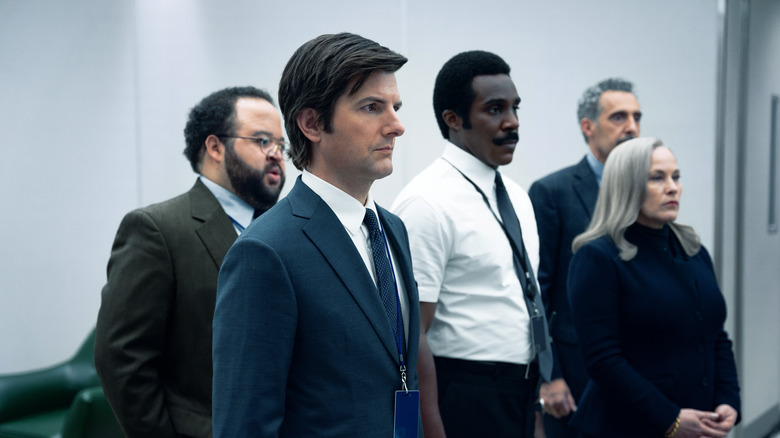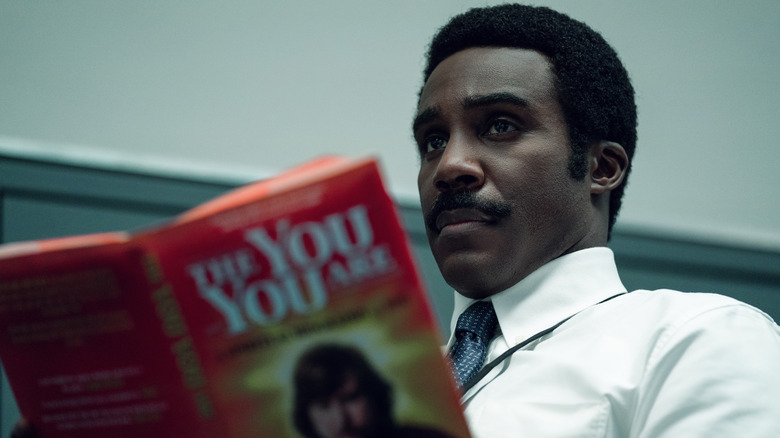Severance Actor Tramell Tillman Talks Milchick's Motivations [Interview]
For "Severance" fans, the character of Milchick — the Lumon devotee who manages the day-to-day for the Macrodata Refinement team — remains a bit of a mystery. We don't know much about his background other than that he's metaphorically drunk a gallon of Lumon Kool-Aid. That devotion to the larger entity is what fueled actor Tramell Tillman's nuanced performance as Milchick.
"It was important to dial into his belief," Tillman told /Film about how he approached portraying his character. "Most devotees who follow anything, they believe that what it is that they're subscribing to has beneficial things — things that are going to help the world. That's something that I can identify with."
Read on for /Film's full conversation with Tillman, including when he knew certain details about certain characters, what scene caused him to break character (just once!), and the moments where we see Milchick at his most vulnerable.
Warning! This interview contains major spoilers for the first season of "Severance."
This interview has been edited for clarity and brevity.
"He seems like a duck on water -- very still, calm -- but on the inside, underneath the water, there's so much going on"
"Severance" is one of the best shows I've seen in a long time, and your character is one of the most fascinating to me because you never really find out why he's such a Lumon devotee. I know you've said before that you still don't officially know much about the character's background, but you have some very intense scenes, so there's clearly a lot of emotions underneath the surface for Milchick. When you're performing scenes like that, where do you pull your motivation from?
For me, it was important to dive into his motivation, his internal life. This is a guy who believes in Lumon culture and what Lumon is offering. And while it's not clear at this time what exactly is happening at Lumon, for me, it was important to dial into his belief. Most devotees who follow anything, they believe that what it is that they're subscribing to has beneficial things — things that are going to help the world. That's something that I can identify with.
So marrying my own personal convictions and my personal relationship with spirituality, it was really easy for me to make that connection with Milchick's motivations, following blindly into an idea for the hope of better humanity as a whole.
And then what I like to do, because I enjoy playing multilayered characters, is just add more flavor and more and more color to this person, so that on the outside, he seems like a duck on water — very still, calm — but on the inside, underneath the water, there's so much going on. With that, it helps to create that suspense, that mystery, and just keeps everybody on their toes on the severed floor, which I believe is 100% manipulation. It's all tactic.
Milchick also has scenes early on with Helly and Ms. Casey where he knows things about them that we don't until later on. When you were playing those scenes with Ms. Casey and with Helly, did you know from the beginning who they were [that Helly is an Eagen and Ms. Casey is Mark's presumed dead wife]? Or was that something that was given to you later in the season?
When I was stepping into this show, there were a lot of bits of information that I was not privy to until I read further into the season. But of course, Milchick knows, and it wasn't revealed to me specifically who Helly was until a little bit later into the season or later into the process as a whole, when we had already started filming. So of course, what was important was even though both Tramell and Milchick knew the significance of Helly's character, we couldn't play that. Milchick couldn't play or treat her any differently than he would treat the rest of the innies on the severed floor.
"Imagine going from a place of anxiety, to anticipation, to excitement, to disappointment"
You said you found out that a little bit later. Did you film that scene with Outie Helly early on when she's getting severed?
[Pauses.] Yes. We filmed all in different times as television does, and it was very unique situation because of the pandemic, so that's why it took me a minute. But yes.
It comes across watching it a second time after watching the whole season — it seemed like Milchick was a little bit more deferential to Outie Helly.
It was definitely an excitement that she's there. Because she's Lumon royalty. And this is a guy who really believes in Lumon, has taken the Lumon Kool-Aid, if you will. So to have someone like this, it's a big, big deal. And even when Helly is being oriented into this process, we're still solving a mystery for us because Petey is missing. So she can't know about Petey's disappearance, either. So there are high stakes even from the very beginning.
There's a couple very memorable scenes with Milchick that happened in later episodes. One that comes to mind immediately is the defiant jazz dancing scene, because it's just so trippy. What was it like to film that?
I absolutely adored filming the music dance experience. "Defiant Jazz" has to be one of my favorite episodes, because we see Milchick maneuver his way through the mess that he's created by the result of the overtime contingency. And we also get to see him let loose. He gets to be physical and he truly believes that this music dance experience is a major incentive for this severed floor. So imagine going from a place of anxiety, to anticipation, to excitement, to disappointment because I'm giving you some fun and you take a bite out of my arm. It's just like, "What are you doing?"
But filming that sequence specifically was a joy. Tara Hart Rodriguez was our choreographer for that, and she served as a guide for us to make sure that we were very specific in Milchick's movements and his dance moves, how we want it to look, how we want it to flow.
And of course, [executive producer and director Ben Stiller] was very vocal about the moves and the energy of it and how it starts off very small and just explodes. We also get to see new ambiance in the space — we don't see the boring fluorescent lights. We actually get some little disco lights going and we have music, this very specific jazz piece that's playing. So it's totally this mind explosion that's happening. It was such a great time. It was challenging. It took us a couple days to film that entire sequence, that entire MDR scene. But it was a joy.
"It's very slight, but there's a little bit of hesitation"
Where do you think Milchick is most himself? Obviously, he has to put on different fronts, especially on the severed floor with the employees, but is there any specific scene where you're like, "Oh, this is pure Milchick." Where there aren't as many layers or filters as he usually has?
There's little moments that happen. I think Milchick reveals himself when he's talking to Helly before she gets severed. We start to see a little bit of his genuineness. When he's attacked by Dylan, there's this moment of vulnerability where he's like, "You took a piece of my arm. You bit me, I'm bleeding!" I think that's really genuine. And then we notice he snaps back into like, "Okay, this is canceled. We're not doing this."
I think there's moments in the Break Room. It's very slight, but there's a little bit of hesitation. Maybe there's a little bit of anxiety and uncertainty about what we're doing here or the effect of it. So I think in this particular season, we don't see big scenes where we see all of Milchick's authenticity, but it is definitely sprinkled in.
You mentioned the Break Room scenes, where it's obviously torture for the people on the other side of Milchick. But for Milchick, he's in there, too, and that must have put a toll on him if he's a believer, especially with Helly.
With Helly, because he knows who she is. And because she has such a strong reaction to it, there may be a little, maybe a little hesitancy. And also Cobel is in the room, too.
Right. Because she's watching through the mirrored window.
She's watching. So there's this constant, "I'm watching them, but then I also am being watched."
"It took probably about an hour or an hour and a half to get the mustache right"
Another scene that's a bit fun is the "kind eyes" scene you have with Mark [played by Adam Scott]. Adam Scott is very talented and one of his many talents is being funny, and he's very funny there. But you're impressively straight-faced. Did you break when filming? How are you able to just not start cracking up?
[Laughs] Vanessa, he got me. There was one take where I asked the question, "Do you know how to make your eyes kind?" And he made a face and he just exaggerated it a little bit and turned it and I broke and he said, "Got him!" I was like, "It was one time." Every other scene I have been straight-faced, strong, smiling when I need to, never broke character. But Adam, he got me at that point.
Well, I can understand why.
It's so funny. And what a question, right? "Do you know how to make your eyes kind?" What a question.
Yeah. How would anyone do that? Especially someone like Mark S. It's fantastic. But you also mentioned how Milchick always has a game face on and a uniform on almost with his look and his outfit. I would love to hear how you used his whole wardrobe and look to inform the character.
All of that is like a suit of armor. It's incredibly specific. Sarah Edwards, who was a costume designer for the show, did a beautiful job crafting how we tell this story of who this guy is through his costume, and Anna Stachow and Bernadette Mazur helped in crafting his mustache. It took probably about an hour or an hour and a half to get the mustache right. Because it was my actual mustache, and my hair grows very rapidly.
So if I wasn't on set every day and I missed a couple days, Anna was in there chipping away to make sure that the hair was right, Daisy Qubian was doing my hair and making sure that the hair was crafted in such a way that also tells the story of his sharpness, his cleanliness, his seriousness. I wear my pants all the way up to the belly button, so that influences the way I walk and all of that — the crisp white shirt, the perfectly tied ties, which I was really adamant of making sure that I tied my own tie. Because I wanted in a certain way, crisp and pristine. All of that really helped to inform who Milchick was for me and spoke to my own creativity. So even the way I walked, the way I spoke, how I moved throughout the space was really a great tool that was bolstered by the costumes and the hair.
The first season of "Severance" is now available on Apple TV+.
